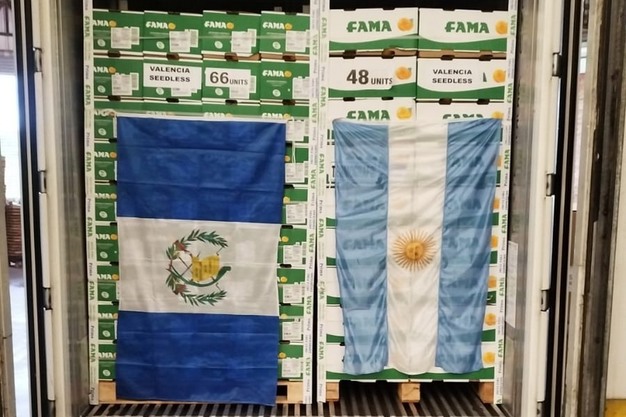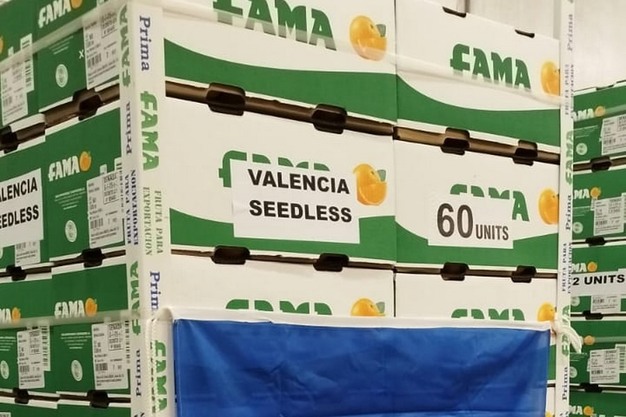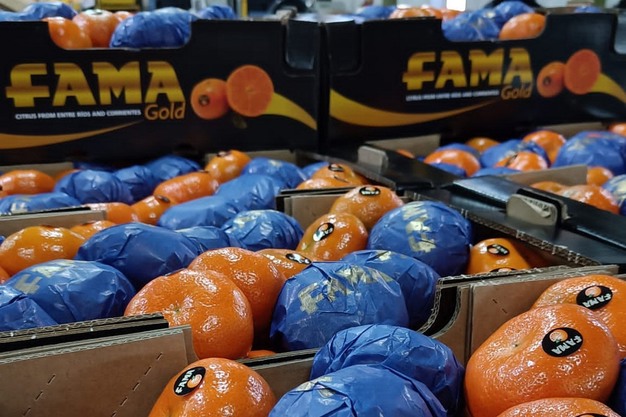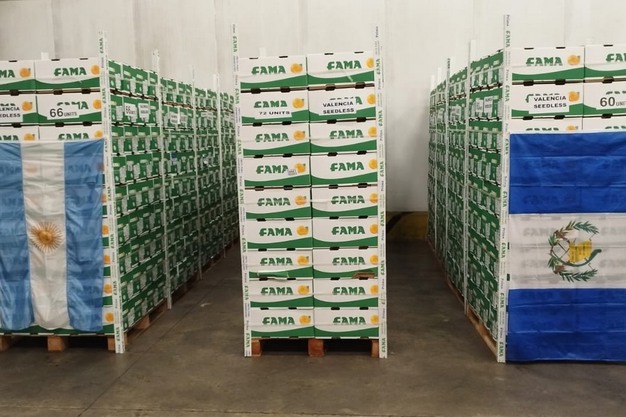As citrus from Egypt enter the markets it signals the time for Southern Hemisphere suppliers like Argentina to exit, because they cannot compete on price. Nahuel Lavino, export sales manager at Fama, an Argentinian citrus exporter and importer, says, "Our season ended well. We exported over 10,000 tons, which is not bad considering our decreasing volumes each year."
 Guatemala opened for Argentina's citrus this 2024 season, with FAMA as the first Argentinian exporter to ship to that destination.
Guatemala opened for Argentina's citrus this 2024 season, with FAMA as the first Argentinian exporter to ship to that destination.
However, he says their pack house has the capacity to pack much more citrus. "The packing house can do much more, so we hope to return slowly to those years! We stopped exports about two weeks ago... once Egypt starts, we can't do anything against their price so the late oranges we place in cold storage for national consumption."
Citrus exports from Argentina to the European Union is still a challenge for this South American country, due to the restrictions imposed. "We ship some fruits to the EU every year, but in very small volumes due to the restrictions that the EU imposes on us. Our biggest markets were the UK, Russia, Canada and Brazil, followed in smaller volumes by Singapore, the EU, the Philippines, Indonesia, and Uzbekistan. Argentina is very restricted to which markets they can export fresh citrus to, that's why this season we were fortunate to open a new market of Guatemala, where our company FAMA, have been the first Argentinian exporter to ship to that destination," explains Lavino.

EU Mercosur deal
The EU Mercosur deal seems like good news for South American exporters but Lavino says, as the citrus industry they are not likely to see the benefits just yet. "For the new Mercosur - UE changes it seems like some of the restrictions are going to be taken down in the future for some things yes, but for oranges and mandarins, they say in 7-10 years' time unfortunately."

A lot of mandarin exports
A lot of countries exported more mandarins than before, causing a drop in prices. "It was a season with a lot more volume of mandarins, where most exporting countries shipped more than previous seasons, especially in the markets where we are more present. This surplus in the number of mandarins exported together with a similar market demand, made prices for mandarins drop quite a bit. In Canada for example there were 11% more mandarins imported this season compared to 2023, in Russia 16% more and South East Asia almost 40% more! All this, combined with a local market which is dead, the huge increase in costs in the country, and the lower prices for exports didn't help local producers in Argentina at all."
The economic reforms of Argentinian President Javier Milei is also hitting the person on the street hard. He instituted several cost-cutting measures that include the reduction or scrapping of a range of subsidies such as fuel with the aim of reigning in state spending. This has started to help stabilise the Argentinian currency the Peso. Last year strict exchange controls and limits were imposed, which impacted international trade and exports. This year it was a bit better comments Lavino.

One positive for the citrus industry worldwide, including in Argentina, is the stronger demand for especially oranges from the juicing industry due to the shortage from Brazil. "Regarding oranges, it is a completely different story, volume has been high and demand as well. There was high demand from Brazil due to their reduction in produce, especially for big sizes, Cat 1 and for juicing as well. Unfortunately, exports to Brazil from Argentina are also severely restricted due to some pests. This makes it troublesome for some to export, but funny enough, these restrictions come only to some, as many individuals and smaller packing houses found alternative ways where no certification/sorting/packing or controls are needed in any way and have been shipping huge volumes with 0 control."
For more information:
Nahuel Lavino
Fama
Tel: +34 636 497 142
Email: [email protected]
www.citrusfama.com.ar
